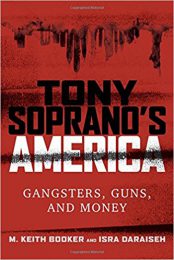The award-winning TV series The Sopranos (HBO) centered on the head of an American mafia family in New Jersey that ran between 1999 and 2007, is believed by many, many TV watchers to be the best series ever.
 It could draw from lots of talent in acting, writing, producing and was probably the most realistic crime story ever to be viewed by millions of people worldwide.
It could draw from lots of talent in acting, writing, producing and was probably the most realistic crime story ever to be viewed by millions of people worldwide.
One of the many reasons for its success was that series picked up various feelings of “endings” in a cultural sense. As the 1990s ended, many Americans felt that the good, save, prosperous times under President Clinton were coming to an end and that the future would become disappointing and bleak.
Furthermore countless references to current-day popular culture, also to mafia movies like The Godfather, were in use and a very earthy and realistic impression of current life and conditions of life in the US (not only for members of the mafia family) were presented.
Besides, the series’ episodes were broadcast not just once within their individual season but were run again a few days later, so that the full scope of dialogue and plot could actually only be comprehended by watching episodes at least twice, since the series offered incredibly much detail in each single episode. Never before was a series produced, broadcast, watched and consumed in this manner.
The two authors of Tony Soprano’s America, while referring to innumerable quotations, situations and plots of the series, cover an astoundingly wide field of topics.
In fifteen subdivisions, we learn about the series’ treatment of postmodernity, its meaning for TV as a genre, popular culture, nostalgia (particularly the 1950s as the golden age of mob activity), capitalism, the value and (mostly) decline of values, cultural roots, ethnicity and religion, the gangster film tradition, the meaning of family ties and family structures, comedy, religion, psychotherapy, the American class system, masculinity, and naturally the history of organized crime in the US.
Accordingly, there are many, many things and conclusions that fall into place after reading Tony Soprano’s America, presented in a strictly non-academic style. Just the same, it provides good entertainment and will probably urge readers to watch the entire saga again, this time with attention to detail.
After all, The Sopranos is a lot about American life.
Review by Dr. A. Ebert © 2017
M. Keith Booker and Isra Daraiseh. Tony Soprano’s America: Gangsters, Guns, and Money. Rowman & Littlefield, 2017, 235 p.
